芯片大家都不陌生。在当今疫情下,显卡,车机的芯片产量锐减影响了不少人的购物需求(反正你也买不到),也让不少人重新认识了半导体行业。闲来无事,我们可以获取一下T网站的芯片库存和芯片信息。
一、列表页请求分析
进入页面,就能看到我们需求的信息了。
但是,在页面请求完成之前,有一点点不对劲,就是页面的各个部份请求的速度是不一样的:
所以啊,需要的数据,大概率不是简单的get请求,所以要进一步去看,特意在开发者模式—Fetch/XHR选项卡中有一个请求,返回值正好是我们需要的内容:
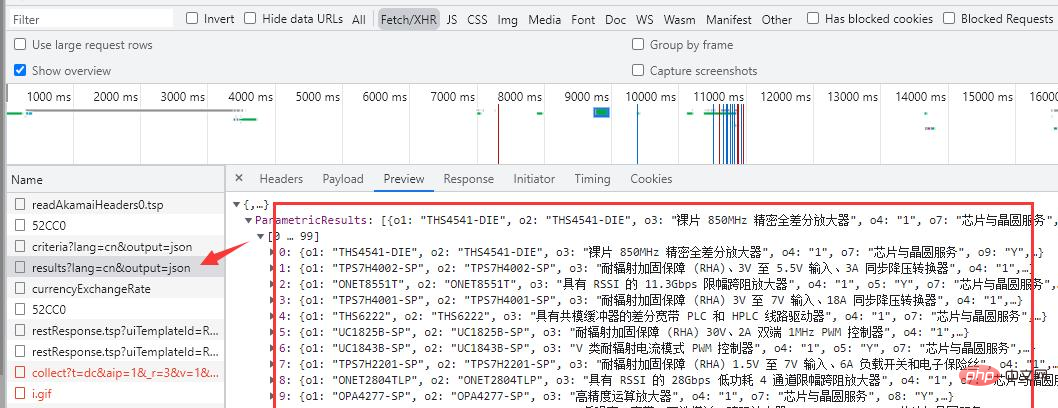
程序员必备接口测试调试工具:立即使用
Apipost = Postman + Swagger + Mock + Jmeter
Api设计、调试、文档、自动化测试工具
后端、前端、测试,同时在线协作,内容实时同步
这一条链接返回了所有的数据,无需翻页,下面开始请求链接。
二、列表页请求
根据上面的链接,直接get请求,分析json即可,上代码:
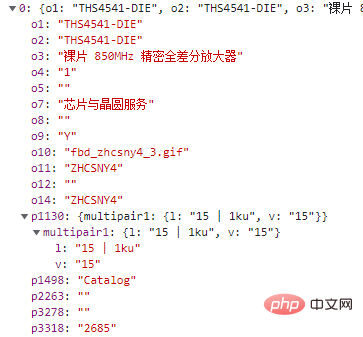
def getItemList(): url = "https://www.xx.com.cn/selectiontool/paramdata/family/3658/results?lang=cn&output=json" headers = { 'authority': 'www.xx.com.cn', "accept": "text/html,application/xhtml+xml,application/xml;q=0.9,image/avif,image/webp,image/apng,*/*;q=0.8,application/signed-exchange;v=b3;q=0.9", "user-agent": "Mozilla/5.0 (Windows NT 10.0; Win64; x64) AppleWebKit/537.36 (KHTML, like Gecko) Chrome/96.0.4664.110 Safari/537.36", } res = getRes(url,headers,'','','GET')//自己写的请求方法 nodes = res.json()['ParametricResults'] for node in nodes: data = {} data["itemName"] = node["o3"] #名称 data["inventory"] = node["p3318"] #库存 data["price"] = node["p1130"]['multipair1']['l'] #价格 data["infoUrl"] = f"https://www.xx.com.cn/product/cn/{node['o1']}"#详情URL
分析上面的json,可知 o3 是商品名,p3318是库存,p1130里面的内容有一个带单位的价格,o1是型号,可凑出详情链接,下面是请求结果:

三、详情页分析
终于拿到详情页链接了,该获取剩下的内容了。
打开开发者模式,没有额外的请求,只有一个包含内容的get请求。
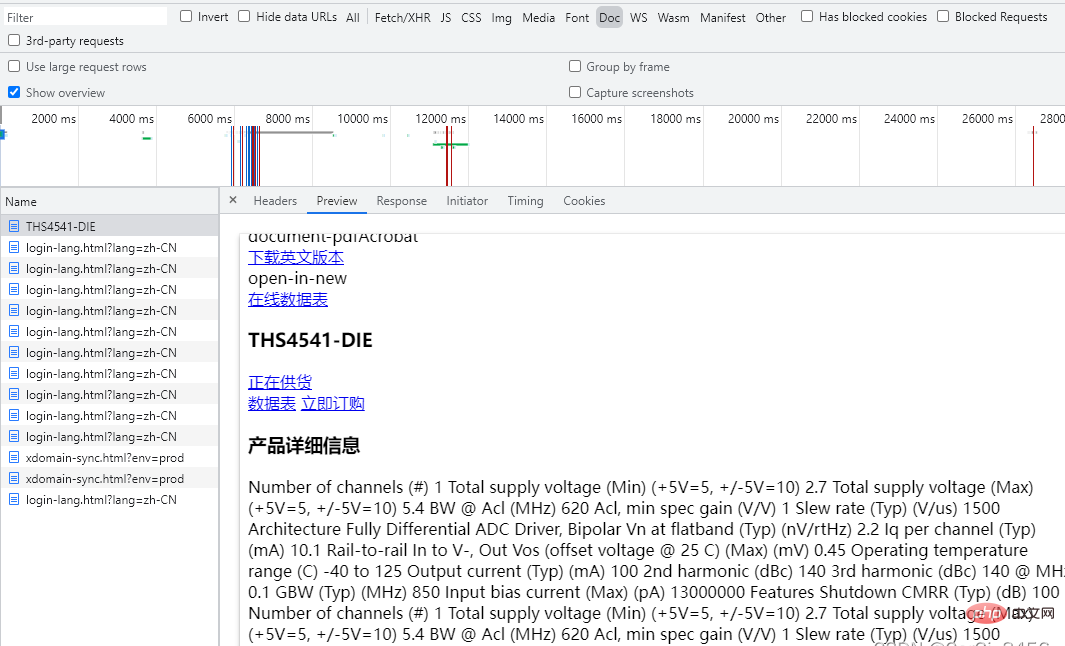
那直接请求不就得了,上代码:
def getItemInfo(url): logger.info(f'正在请求详情url-{url}') headers = { 'authority': 'www.xx.com.cn', 'accept': "text/html,application/xhtml+xml,application/xml;q=0.9,image/avif,image/webp,image/apng,*/*;q=0.8,application/signed-exchange;v=b3;q=0.9", 'user-agent': "Mozilla/5.0 (Windows NT 10.0; Win64; x64) AppleWebKit/537.36 (KHTML, like Gecko) Chrome/96.0.4664.110 Safari/537.36", 'referer':'https://www.xx.com.cn/product/cn/THS4541-DIE', } res = getRes(url, headers,'', '', 'GET')//自己写的请求方法 content = res.content.decode('utf-8')
但是发现,请求的详情页,跟开发者模式的预览怎么不太一样?

我这里的第一反应就觉得,完了,这个需要cookie。
继续分析,清屏开发者模式,清除cookie,再次访问详情链接,在All选项卡中,可以发现:

本以为该请求一次的详情页链接请求了两次,两次中间还有一个xhr请求。
预览第一次请求,可以发现跟刚才本地请求的内容相差无几:
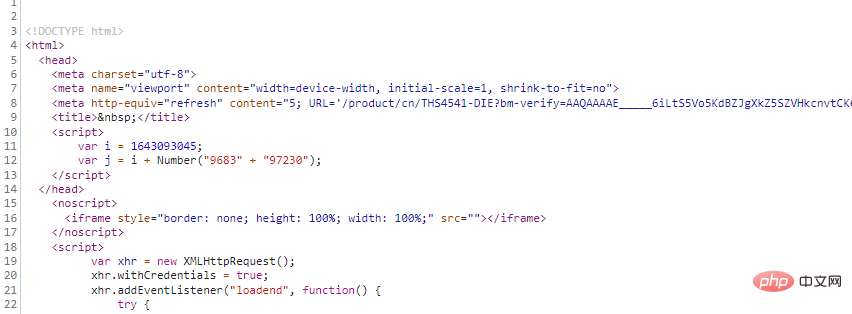
所以问题出在第二次的请求,进一步分析:
查看第二次的get请求,与第一次的请求相差了一堆cookie
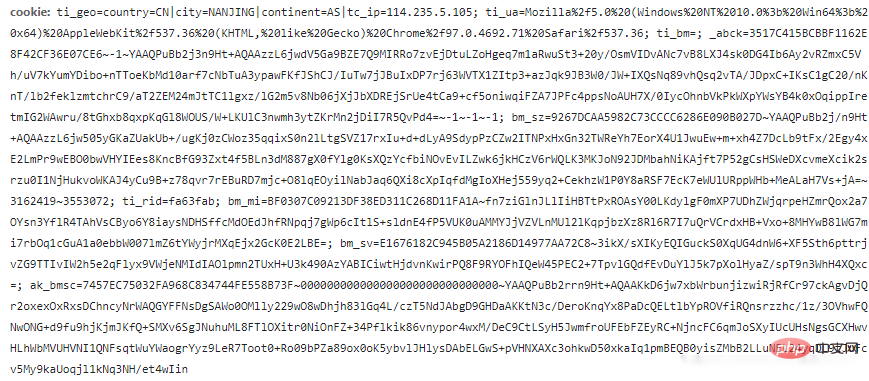
简化cookie,发现这些cookie最关键的参数是ak_bmsc这一部分,而这一部分参数,就来自上一个xhr请求中的响应头set-cookie中:

分析这个xhr请求,请求链接
这是个post请求,先从payload参数下手:

这个bm-verify参数,是不是有些眼熟?这就是第一次的get请求返回的内容吗,下面还有一个pow参数:

"pow":j,这个j参数就在上面,声明了i和两个拼接的数字字符串转成int之后相加之后的结果:

通过这一系列请求,返回了最终get请求所需要的cookie,讲的比较琐碎,上代码:
#详情需要cookie def getVerify(url): infourl = url headers = { 'authority': 'www.xx.com.cn', "accept": "text/html,application/xhtml+xml,application/xml;q=0.9,image/avif,image/webp,image/apng,*/*;q=0.8,application/signed-exchange;v=b3;q=0.9", "user-agent": "Mozilla/5.0 (Windows NT 10.0; Win64; x64) AppleWebKit/537.36 (KHTML, like Gecko) Chrome/96.0.4664.110 Safari/537.36", } proxies = getApiIp()//取代理 if proxies: #无cookie访问详情页拿参数bm-verify,pow res = getRes(infourl,headers,proxies,'','GET') if res: #拿第一次请求的ak_bmsc cookie = re.findall("ak_bmsc=.*?;",res.headers['set-cookie'])[0] #拿bm-verify verifys = re.findall('"bm-verify": "(.*?)"', res.text)[0] #合并字符串转int相加取pow a = re.findall('var i = (d+);',res.text)[0] b = re.findall('Number("(.*?)");',res.text)[0] b = int(b.replace('" + "','')) pow = int(a)+b post_data = { 'bm-verify': verifys, 'pow':pow } #转json post_data = json.dumps(post_data) if verifys: logger.info('第一次参数获取完毕') return post_data,proxies,cookie else: print('verify获取异常') else: print('verify请求出错') # 第二次带参数访问验证链接 def getCookie(url): post_headers = { "authority": "www.xx.com.cn", "user-agent": "Mozilla/5.0 (Windows NT 10.0; Win64; x64) AppleWebKit/537.36 (KHTML, like Gecko) Chrome/97.0.4692.71 Safari/537.36", "accept": "*/*", "content-type": "application/json", "origin": "https://www.xx.com.cn", "referer":url, } post_data,proxies,c_cookie = getVerify(url) post_headers['Cookie'] = c_cookie posturl = "https://www.xx.com.cn/_sec/verify?provider=interstitial" check = getRes(posturl,post_headers,proxies,post_data,'POST') if check: #从请求头拿到ak_bmsc cookie cookie = check.headers['Set-Cookie'] cookie = re.findall("ak_bmsc=.*?;",cookie)[0] if cookie: logger.info('Cookie获取完毕') return cookie,proxies else: print('cookie获取异常') else: print('cookie请求出错')
简单的概括一下详情页的请求流程:
第一次请求,取得所需参数bm-verify,pow,cookie,提供给下一次的post请求(getVerify方法)
第二次请求,根据已知条件进行post请求,并获取响应头cookie的ak_bmsc(getCookie)
切记,在整个获取cookie的三次请求过程中,第二、三两次请求都需要伴随着上一次请求的ak_bmsc作为cookie传递,第二次请求需要第一次的ak_bmsc,最终请求需要第二次的ak_bmsc。
四、详情页请求
def getItemInfo(url): logger.info(f'正在请求详情url-{url}') cookie,proxies = getCookie(url) headers = { 'authority': 'www.xx.com.cn', 'accept': "text/html,application/xhtml+xml,application/xml;q=0.9,image/avif,image/webp,image/apng,*/*;q=0.8,application/signed-exchange;v=b3;q=0.9", 'user-agent': "Mozilla/5.0 (Windows NT 10.0; Win64; x64) AppleWebKit/537.36 (KHTML, like Gecko) Chrome/96.0.4664.110 Safari/537.36", 'referer':'https://www.xx.com.cn/product/cn/THS4541-DIE', 'cookie':cookie } res = getRes(url, headers,proxies, '', 'GET') content = res.content.decode('utf-8') print(content) exit() sel = Selector(text=content) Parameters = sel.xpath('//ti-tab-panel[@tab-title="参数"]/ti-view-more/div').extract_first() Features = sel.xpath('//ti-tab-panel[@tab-title="特性"]/ti-view-more/div').extract_first() Description = sel.xpath('//ti-tab-panel[@tab-title="描述"]/ti-view-more').extract_first() if Parameters and Features and Description: return Parameters,Features,Description
通过上一步cookie的获取,带着cookie再次访问详情链接,就可以顺利的获取内容并可以使用xpath进行解析,获取需要的内容。
五、代理设置
T网站详情页带cookie请求有100多次,如果用本地代理一直去请求,会有IP封锁的可能性出现,导致无法正常获取。所以,需要高效请求的话,优质稳定的代理IP必不可少,我这里使用的ipidea代理请求的T网站,数据很快就访问出来了。
地址:http://www.ipidea.net/?utm-source=csdn&utm-keyword=?wb ,首次可以白嫖流量哦。本次使用的api获取,代码如下:
# api获取ip def getApiIp(): # 获取且仅获取一个ip api_url = 'http://tiqu.ipidea.io:81/abroad?num=1&type=2&lb=1&sb=0&flow=1®ions=&port=1' res = requests.get(api_url, timeout=5) try: if res.status_code == 200: api_data = res.json()['data'][0] proxies = { 'http': 'http://{}:{}'.format(api_data['ip'], api_data['port']), 'https': 'http://{}:{}'.format(api_data['ip'], api_data['port']), } print(proxies) return proxies else: print('获取失败') except: print('获取失败')
六、代码汇总
# coding=utf-8 import requests from scrapy import Selector import re import json from loguru import logger # api获取ip def getApiIp(): # 获取且仅获取一个ip api_url = '获取代理地址' res = requests.get(api_url, timeout=5) try: if res.status_code == 200: api_data = res.json()['data'][0] proxies = { 'http': 'http://{}:{}'.format(api_data['ip'], api_data['port']), 'https': 'http://{}:{}'.format(api_data['ip'], api_data['port']), } print(proxies) return proxies else: print('获取失败') except: print('获取失败') def getItemList(): url = "https://www.xx.com.cn/selectiontool/paramdata/family/3658/results?lang=cn&output=json" headers = { 'authority': 'www.xx.com.cn', "accept": "text/html,application/xhtml+xml,application/xml;q=0.9,image/avif,image/webp,image/apng,*/*;q=0.8,application/signed-exchange;v=b3;q=0.9", "user-agent": "Mozilla/5.0 (Windows NT 10.0; Win64; x64) AppleWebKit/537.36 (KHTML, like Gecko) Chrome/96.0.4664.110 Safari/537.36", } proxies = getApiIp() if proxies: # res = requests.get(url, headers=headers, proxies=proxies) res = getRes(url,headers,proxies,'','GET') nodes = res.json()['ParametricResults'] for node in nodes: data = {} data["itemName"] = node["o3"] #名称 data["inventory"] = node["p3318"] #库存 data["price"] = node["p1130"]['multipair1']['l'] #价格 data["infoUrl"] = f"https://www.ti.com.cn/product/cn/{node['o1']}"#详情URL Parameters, Features, Description = getItemInfo(data["infoUrl"]) data['Parameters'] = Parameters data['Features'] = Features data['Description'] = Description print(data) #详情需要cookie def getVerify(url): infourl = url headers = { 'authority': 'www.xx.com.cn', "accept": "text/html,application/xhtml+xml,application/xml;q=0.9,image/avif,image/webp,image/apng,*/*;q=0.8,application/signed-exchange;v=b3;q=0.9", "user-agent": "Mozilla/5.0 (Windows NT 10.0; Win64; x64) AppleWebKit/537.36 (KHTML, like Gecko) Chrome/96.0.4664.110 Safari/537.36", } proxies = getApiIp() if proxies: #访问详情页拿参数bm-verify,pow res = getRes(infourl,headers,proxies,'','GET') if res: #拿第一次请求的ak_bmsc cookie = re.findall("ak_bmsc=.*?;",res.headers['set-cookie'])[0] #拿bm-verify verifys = re.findall('"bm-verify": "(.*?)"', res.text)[0] #字符串转int相加取pow a = re.findall('var i = (d+);',res.text)[0] b = re.findall('Number("(.*?)");',res.text)[0] b = int(b.replace('" + "','')) pow = int(a)+b post_data = { 'bm-verify': verifys, 'pow':pow } #转json post_data = json.dumps(post_data) if verifys: logger.info('第一次参数获取完毕') return post_data,proxies,cookie else: print('verify获取异常') else: print('verify请求出错') # 第二次带参数访问验证链接 def getCookie(url): post_headers = { "authority": "www.xx.com.cn", "user-agent": "Mozilla/5.0 (Windows NT 10.0; Win64; x64) AppleWebKit/537.36 (KHTML, like Gecko) Chrome/97.0.4692.71 Safari/537.36", "accept": "*/*", "content-type": "application/json", "origin": "https://www.xx.com.cn", "referer":url, } post_data,proxies,c_cookie = getVerify(url) post_headers['Cookie'] = c_cookie posturl = "https://www.xx.com.cn/_sec/verify?provider=interstitial" check = getRes(posturl,post_headers,proxies,post_data,'POST') if check: #从请求头拿到ak_bmsc cookie cookie = check.headers['Set-Cookie'] cookie = re.findall("ak_bmsc=.*?;",cookie)[0] if cookie: logger.info('Cookie获取完毕') return cookie,proxies else: print('cookie获取异常') else: print('cookie请求出错') def getItemInfo(url): logger.info(f'正在请求详情url-{url}') cookie,proxies = getCookie(url) headers = { 'authority': 'www.xx.com.cn', 'accept': "text/html,application/xhtml+xml,application/xml;q=0.9,image/avif,image/webp,image/apng,*/*;q=0.8,application/signed-exchange;v=b3;q=0.9", 'user-agent': "Mozilla/5.0 (Windows NT 10.0; Win64; x64) AppleWebKit/537.36 (KHTML, like Gecko) Chrome/96.0.4664.110 Safari/537.36", 'referer':'https://www.xx.com.cn/product/cn/THS4541-DIE', 'cookie':cookie } res = getRes(url, headers,proxies, '', 'GET') content = res.content.decode('utf-8') sel = Selector(text=content) Parameters = sel.xpath('//ti-tab-panel[@tab-title="参数"]/ti-view-more/div').extract_first() Features = sel.xpath('//ti-tab-panel[@tab-title="特性"]/ti-view-more/div').extract_first() Description = sel.xpath('//ti-tab-panel[@tab-title="描述"]/ti-view-more').extract_first() if Parameters and Features and Description: return Parameters,Features,Description #专门发送请求的方法,代理请求三次,三次失败返回错误 def getRes(url,headers,proxies,post_data,method): if proxies: for i in range(3): try: # 传代理的post请求 if method == 'POST': res = requests.post(url,headers=headers,data=post_data,proxies=proxies) # 传代理的get请求 else: res = requests.get(url, headers=headers,proxies=proxies) if res: return res except: print(f'第{i}次请求出错') else: return None else: for i in range(3): proxies = getApiIp() try: # 请求代理的post请求 if method == 'POST': res = requests.post(url, headers=headers, data=post_data, proxies=proxies) # 请求代理的get请求 else: res = requests.get(url, headers=headers, proxies=proxies) if res: return res except: print(f"第{i}次请求出错") else: return None if __name__ == '__main__': getItemList()

通过上述步骤,已经能获取所需内容。
总结
整个T网站的数据获取,难点就在详情页的cookie,(其实也不是很难,只不过cookie太长比较费眼)理顺了整个请求流程,剩下的就是请求的过程。稳定高效的IP代理会让你事半功倍,通过api获取可变的代理也不易被网站封禁,从而更好地获取数据。简化cookie的时候使用合适的请求工具会更方便,比如postman,burp。
这次的整个流程到此结束,讲的比较啰嗦,若有错误或者更好的方法请大佬指正!
【
 站长资讯网
站长资讯网